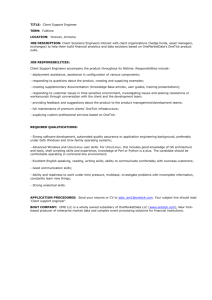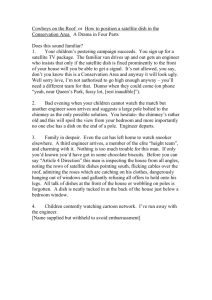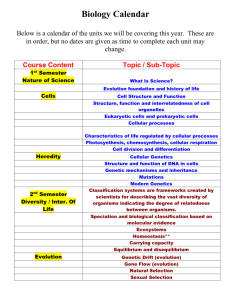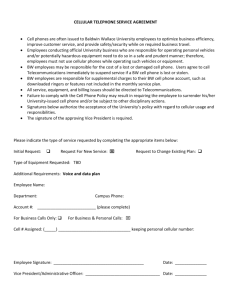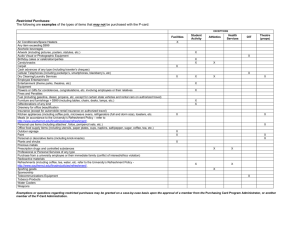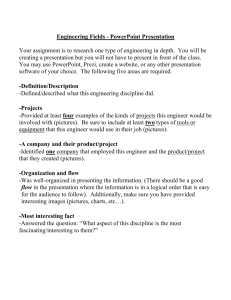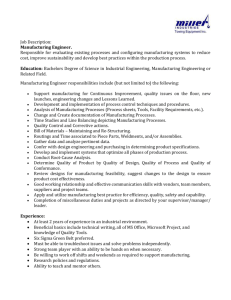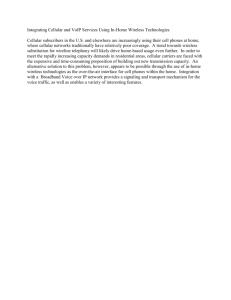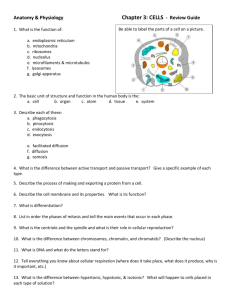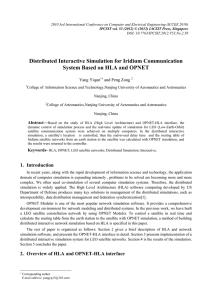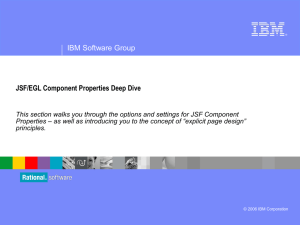awards, professional societies & organizations
advertisement
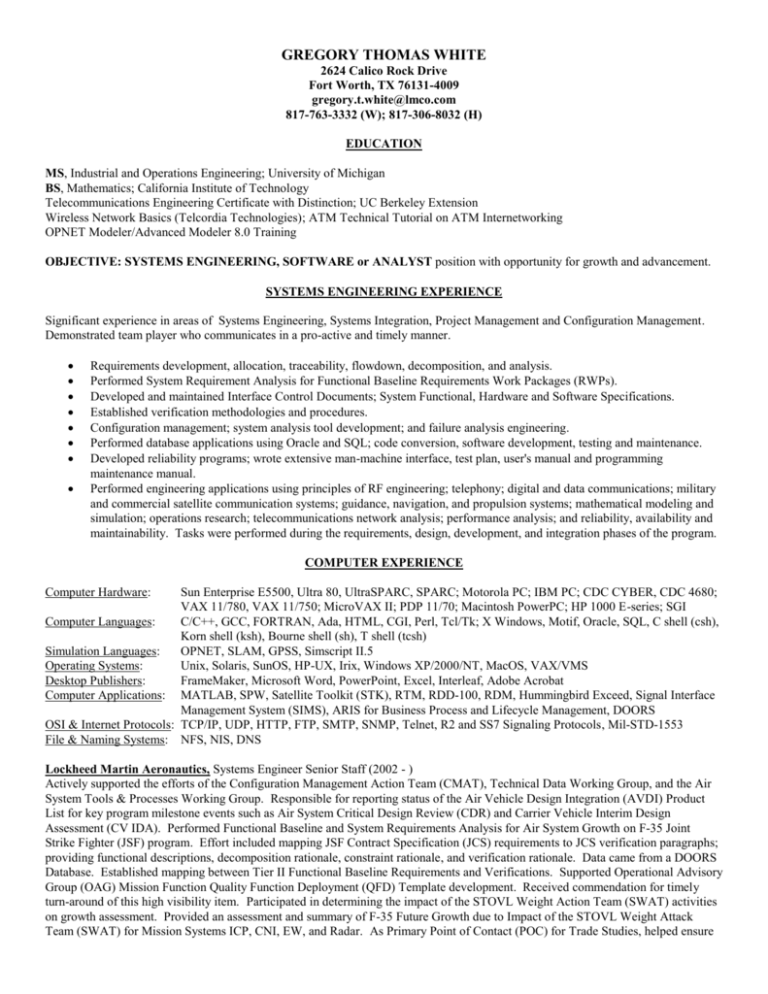
GREGORY THOMAS WHITE 2624 Calico Rock Drive Fort Worth, TX 76131-4009 gregory.t.white@lmco.com 817-763-3332 (W); 817-306-8032 (H) EDUCATION MS, Industrial and Operations Engineering; University of Michigan BS, Mathematics; California Institute of Technology Telecommunications Engineering Certificate with Distinction; UC Berkeley Extension Wireless Network Basics (Telcordia Technologies); ATM Technical Tutorial on ATM Internetworking OPNET Modeler/Advanced Modeler 8.0 Training OBJECTIVE: SYSTEMS ENGINEERING, SOFTWARE or ANALYST position with opportunity for growth and advancement. SYSTEMS ENGINEERING EXPERIENCE Significant experience in areas of Systems Engineering, Systems Integration, Project Management and Configuration Management. Demonstrated team player who communicates in a pro-active and timely manner. Requirements development, allocation, traceability, flowdown, decomposition, and analysis. Performed System Requirement Analysis for Functional Baseline Requirements Work Packages (RWPs). Developed and maintained Interface Control Documents; System Functional, Hardware and Software Specifications. Established verification methodologies and procedures. Configuration management; system analysis tool development; and failure analysis engineering. Performed database applications using Oracle and SQL; code conversion, software development, testing and maintenance. Developed reliability programs; wrote extensive man-machine interface, test plan, user's manual and programming maintenance manual. Performed engineering applications using principles of RF engineering; telephony; digital and data communications; military and commercial satellite communication systems; guidance, navigation, and propulsion systems; mathematical modeling and simulation; operations research; telecommunications network analysis; performance analysis; and reliability, availability and maintainability. Tasks were performed during the requirements, design, development, and integration phases of the program. COMPUTER EXPERIENCE Computer Hardware: Sun Enterprise E5500, Ultra 80, UltraSPARC, SPARC; Motorola PC; IBM PC; CDC CYBER, CDC 4680; VAX 11/780, VAX 11/750; MicroVAX II; PDP 11/70; Macintosh PowerPC; HP 1000 E-series; SGI Computer Languages: C/C++, GCC, FORTRAN, Ada, HTML, CGI, Perl, Tcl/Tk; X Windows, Motif, Oracle, SQL, C shell (csh), Korn shell (ksh), Bourne shell (sh), T shell (tcsh) Simulation Languages: OPNET, SLAM, GPSS, Simscript II.5 Operating Systems: Unix, Solaris, SunOS, HP-UX, Irix, Windows XP/2000/NT, MacOS, VAX/VMS Desktop Publishers: FrameMaker, Microsoft Word, PowerPoint, Excel, Interleaf, Adobe Acrobat Computer Applications: MATLAB, SPW, Satellite Toolkit (STK), RTM, RDD-100, RDM, Hummingbird Exceed, Signal Interface Management System (SIMS), ARIS for Business Process and Lifecycle Management, DOORS OSI & Internet Protocols: TCP/IP, UDP, HTTP, FTP, SMTP, SNMP, Telnet, R2 and SS7 Signaling Protocols, Mil-STD-1553 File & Naming Systems: NFS, NIS, DNS Lockheed Martin Aeronautics, Systems Engineer Senior Staff (2002 - ) Actively supported the efforts of the Configuration Management Action Team (CMAT), Technical Data Working Group, and the Air System Tools & Processes Working Group. Responsible for reporting status of the Air Vehicle Design Integration (AVDI) Product List for key program milestone events such as Air System Critical Design Review (CDR) and Carrier Vehicle Interim Design Assessment (CV IDA). Performed Functional Baseline and System Requirements Analysis for Air System Growth on F-35 Joint Strike Fighter (JSF) program. Effort included mapping JSF Contract Specification (JCS) requirements to JCS verification paragraphs; providing functional descriptions, decomposition rationale, constraint rationale, and verification rationale. Data came from a DOORS Database. Established mapping between Tier II Functional Baseline Requirements and Verifications. Supported Operational Advisory Group (OAG) Mission Function Quality Function Deployment (QFD) Template development. Received commendation for timely turn-around of this high visibility item. Participated in determining the impact of the STOVL Weight Action Team (SWAT) activities on growth assessment. Provided an assessment and summary of F-35 Future Growth due to Impact of the STOVL Weight Attack Team (SWAT) for Mission Systems ICP, CNI, EW, and Radar. As Primary Point of Contact (POC) for Trade Studies, helped ensure timely disposition of trade studies that had potential impact on both Technology Refreshment and Growth Management. Responsible for managing and coordinating Technology Refreshment and Growth Management issues including Obsolescence and Diminishing Manufacturing Sources (DMS) for JSF program. Established workflows via JSF Data Library (JDL) to ensure that all Tech Refresh and Growth Management released documents satisfied all ITAR requirements. Authored the Technology Refreshment Action Plan (TRAP), which describes an affordable lifecycle-based military procurement strategy capable of achieving government lifecycle cost objectives to reduce Total Ownership Cost (TOC) and remaining viable throughout all lifecycle phases. Performed a risk assessment to determine extent of regression test and coordination activity required for a given refreshment action to assure a low-risk approach to technology refreshment. Supported development, review, and maintenance of the Technology Refreshment Management Plan (TRMP) and the Growth Provisions Management Plan (GPMP). My involvement with the JSF program is during the requirements, design, and development phases of this fighter jet airplane program. Boeing, Systems Engineer (July 2001 - October 2001), contract position Developed and tested battery power model as part of an OPNET and Visual C++ simulation for radio link transceivers that computed the energy expended of a signal associated with a transmitted packet. Examined feasibility of implementing frequency reuse patterns among dispersed users that followed a 4-cell pattern. Established documentation that described the modeling tool inventory capability. Developed installation and execution procedures for software applications including MATLAB, SPW, and Satellite Toolkit (STK) in a hybrid Solaris Unix, Windows 2000/NT environment. Installed and configured software for HP network printers on Sun Solaris 8.0/2.6 platform. Tasks were performed as a part of the performance modeling and simulation team for the Global Information Grid (GIG) Communications Architecture. Performed Windows and Unix system admin functions as needed to help maintain continuity. Work involved communication systems and was performed on a contract basis in support of the Future Combat Systems (FCS) program. Corsair Communications, Software QA Manager (2000 - 2001) Managed the software quality assurance activities for the PrePay and PrePay Open product lines. These products provided prepaid billing solutions for the global wireless industry, were written in C++ and Java, and were developed in a Unix/Windows NT Client/Server and Oracle/SQL database environment. Managed software testing and regression test suite development activities. Led team in performing system level (black box) testing, product testing, system integration, and component level functional testing; Graphical User Interface (GUI) testing, regression testing, version compatibility testing, and load testing. Led development and implementation of test automation tools such as Winrunner; managed product delivery schedules; documented and verified defects through defect tracking system (ddts). Generated reports reflecting problem report status. Wrote test plans, test procedures, and test reports. Wrote Software Quality Assurance Report for PrePay 7.0 Release. Co-wrote Test Plan for PrePay Open 2.0/6.0. Lockheed Martin Corporation, Systems Engineer Specialist (1996 - 2000) ISO 9001 Point of Contact (POC) for military satellite communications program - responsible for ensuring compliance with standard practices and procedures. Established verification methodologies and procedures for Milstar. Established provision for running Satellite Tool Kit (STK) via remote Sun Unix Workstation using scripts. Established user accounts, printer functionality, and file system configuration for Unix system. Performed loading scenarios using Global Loader. Used OPNET to model physical link characteristics, buffer allocation, packet flow between network elements, and end-to-end delay calculations for an ATM-based communications network. Effort involved examining various network topologies and developing process models using finite state machines. Performed resource allocation and analyzed data link MAC layer parameters. Co-authored Spacecraft to Launch Vehicle Interface Control Document (ICD) for commercial satellite communications program. Provided recommendations for analytical tools to be acquired in establishing Simulation Analysis Testbed. Supported development and maintenance of Broadband System Specifications, System Requirements Review, and System Design Review. Work was performed during design phase of the program. United Defense LP (FMC Corp.), Senior Systems Engineer (1995 - 1996) Performed requirements traceability on Bradley A3, a Mil-STD-1553-based program using RTM. Performed requirements flow-down from the System Specification level, down through the Functional Specification level, and further down to the Configuration Item (CI) level. Initiated and maintained A3 Systems Engineering Web pages for online use of relevant documents, processes and procedures. Motorola, Cellular Infrastructure Group, Lead Engineer (1993 - 1995) Performed modeling and analysis of cellular switching systems including determination of switch network capacity based on System and Software Specifications using Simscript II.5. Performed load line linear regression, network growth capacity studies, and forecasting of evolving cellular networks using gnuplot and perl scripts. Created and executed command script files on EMX2500 cellular switch based on Hardware and Software ICDs. Trained in fundamentals of cellular networks and EMX2500 switch technology. Authored "Growth Forecast Analysis of Caracas Cellular Network", "Beijing Load Line Analysis Report", and "Standard Performance Run Report", based on lab testing and analysis of network of cellular switches. Developed and maintained specifications of electronic switching systems for international cellular customers. Wrote performance impact specifications for new features. Martin Marietta, Sr. Software Engineer, Sr. Systems Engineer (1985 - 1993) Software development, testing and maintenance of Modularized Scientific Software Simulation (MSSS) for Titan IV military satellite program. Trajectory simulation source code used modularized, top down structured programming, contained hundreds of subroutines, 100,000 lines of FORTRAN and C code, and was maintained in Source Code Control System (SCCS) using makefiles. Simulation program modeled the guidance, navigation, and propulsion systems of Titan IV and Centaur rockets. Developed and incorporated logarithmic interpolation scheme and message/task contention scenarios into System Performance Model. Converted source code from CDC Cyber to CDC 4680; then tested, validated and maintained it. Availability, performance modeling and analysis of communications network using SLAM for Portable ASAS Workstation (PAWS). Developed functional specifications of hardware components; and computed throughput, utilization and delay times. Performed requirements traceability for army intelligence system. Contel Information Systems, Scientist Specialist (1983 - 1985) Received plaque recognizing contributions toward successful transitional year. Developed user-friendly reliability software tools for a communications system using man-machine interface. Reliability, Maintainability and Availability (RMA) and Failure Mode Distribution Analysis. Authored "RMA User's Manual", "Fault Isolation Program", "Design Analysis Report: RMA", "MTBF User's Manual", "MTBF Maintenance Manual", and "MTBF Test Plan". Conducted seminar introducing staff members to RMA software and manuals. Work was performed during the design phase of the program. AWARDS, PROFESSIONAL SOCIETIES & ORGANIZATIONS SPOT Award on JSF Program from Tom Burbage and Bob Elrod for actively supporting the Workforce Vitality Team International Council of Systems Engineers (INCOSE) Member IEEE Computer Society Associate Member Undergraduate Admissions Support (UAS) Alumni Representative for the California Institute of Technology
